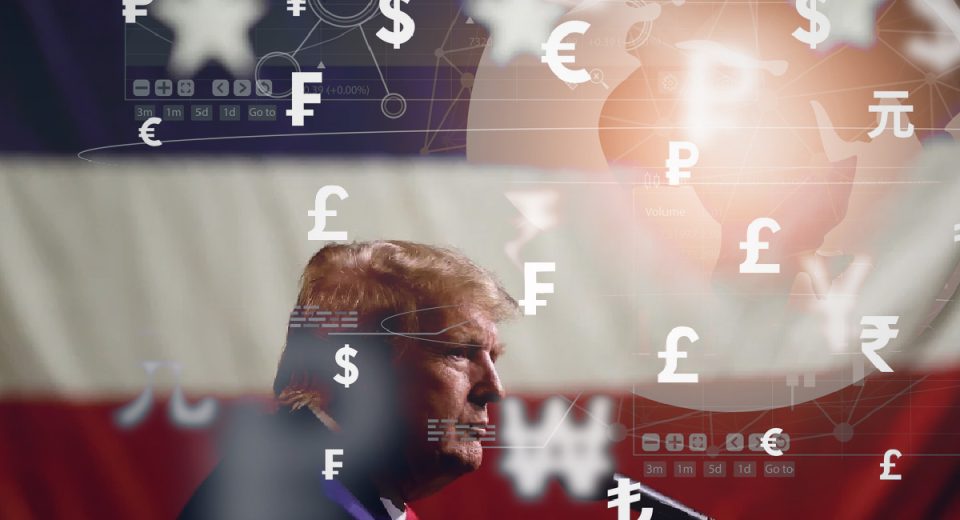Will the US Presidential Elections Impact Financial Markets?

As 5 November draws closer, the world is waiting, almost with bated breath, for the Trump-Biden rematch. Traders are also keeping their eye on the US presidential election 2024 because it will shape America’s domestic and foreign policy, which will have ripple effects all across the world. We’ve already been hearing Trump talk about his stance on immigration and intentions to raise tariffs on goods imported into the US dramatically. If this happens, the cost of acquiring raw materials will soar, which will have a direct impact on the profitability of American companies. On the other hand, it could rekindle inflation, which would propel the Federal Reserve to rethink interest rate cuts.
There also are concerns about the US-China trade war being re-ignited if Trump wins and follows through with his claims of a 60% hike in tariffs on Chinese goods. This could derail the supply chain, which is just about getting back on track.
But an election year means an increase in opportunities for traders because all this speculation on the future of the US economy leads to market volatility. So, what should you expect in the months leading up to and after the elections?
How a US Election Year Impacts the Markets
Historically, the markets have been volatile during election years due to uncertainties associated with potential policy changes and their impact on economic health. This is especially true of the stock markets. The S&P 500 has recorded average returns of 11.28% in election years, compared to 7.7% in regular years. When a Republican president was elected, the return jumped to an average of 15.3%, with an average return of 7.6% when a Democrat was elected. And the index was already up 12.2% as of May 22, 2024.
Looking at sector-wise performance over the past 8 election years, some trends become apparent:
- Defensive and technology stocks tend to underperform.
- Finance stocks perform the best. The only exception is amid the 2008 financial crisis.
- Other sectors also tend to outperform.
- Small-cap stocks performed well in 2016.
The polls so far suggest that it will be a hard-fought election in 2024, with both candidates running neck-to-neck, with Trump holding a modest lead for now in the “battleground” states. But a lot can happen between nowand November 5.
Also, remember that the US presidential election only has a short-term impact on the markets. The long-term trajectory tends to be determined by an interplay of multiple factors, including geopolitics, macroeconomics and company fundamentals. In fact, historical data indicates that economic factors, such as inflation, have a greater and more consistent impact on market returns than election outcomes.
For those who want to capitalise on market opportunities before the elections and once the results are declared, news trading could be a viable strategy.
Top Tips on Trading the US Elections
News trading is a strategy where you attempt to capitalise on market sentiment leading up to the release of important news and/or the market’s response to the news, once it is released. There are essentially two types of news trading strategies -one that focuses on recurring news releases, such as economic data announcements, and the other takes advantage of one-time or unexpected news events, such as the death of Iran’s President, Ebrahim Raisi, in a helicopter crash on May 19, just a month before the country’s presidential election is to be held.
Every poll and primary result will become a one-time news event leading up to the US elections, followed by the lead-up to November 5, and, finally, the announcement of the 47th US President, which news traders can optimise on. But to make the most of the ensuing market volatility, here are some things to keep in mind to hone your trading strategy.
- Know the dates of important announcements. Just like an economic calendar keeps you updated on economic data release dates, keep an eye on the dates of US primaries and caucuses.
- Put your strategy in place in advance and stick to it. This will prevent you from making impulsive decisions under the influence of emotions, such as fear and greed.
- Use technical analysis. Identify entry and exit levels based on thorough analysis, and don’t forget to include risk management measures, such as stop loss and take profit orders.
- Understand your risk tolerance and trading psyche. This will help you understand whether to sit out major price fluctuations or open a trade. Many beginners prefer to trade the fade rather than attempting to capture high volatility.
- Use market sentiment but avoid the herd mentality. Market sentiment has a significant impact on market direction. But herd mentality could tempt you to buy high due to euphoria and sell low when gloom sets in.
- Trade the fade. There are times when it is better to take a break during peak volatility, wait for the market to digest the news and then enter the market.
To Sum Up
- The widely differing economic and political views of the two US presidential candidates create uncertainty in the lead-up to the results of the elections.
- The markets tend to be volatile during election years, with the S&P 500 recording higher average returns during these years compared to regular years.
- Some sectors perform better than others, such as the finance sector.
- But elections only have a short-term impact on the financial markets. Long-term trajectories are determined by multiple factors.
- News trading is a potentially viable strategy to trade the announcements related to the US elections.
- It is important to stick to a tried and tested strategy, using technical analysis for trading decisions, rather than following a herd mentality.
Disclaimer
All data, information, and materials are published and provided “as is” solely for informational purposes only, and is not intended nor should be considered, in any way, as investment advice, recommendations, and/or suggestions for performing any actions with financial instruments. The information and opinions presented do not consider any particular individual’s investment objectives, financial situation, or needs, and hence does not constitute as an advice or a recommendation with respect to any investment product. All investors should seek advice from certified financial advisors based on their unique situation before making any investment decisions in accordance to their personal risk appetite. Blackwell Global endeavours to ensure that the information provided is complete and correct, but make no representation as to the actuality, accuracy or completeness of the information. Information, data, and opinions may change without notice and Blackwell Global is not obliged to update on the changes. The opinions and views expressed are solely those of the authors and analysts and do not necessarily represent that of Blackwell Global or its management, shareholders, and affiliates. Any projections or views of the market provided may not prove to be accurate. Past performance is not necessarily an indicative of future performance. Blackwell Global assumes no liability for any loss arising directly or indirectly from use of or reliance on such information here in contained. Reproduction of this information, in whole or in part, is not permitted.




